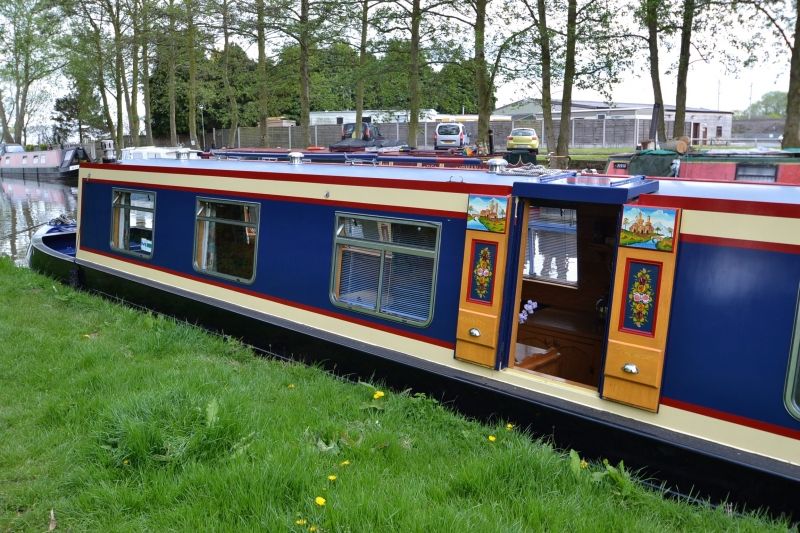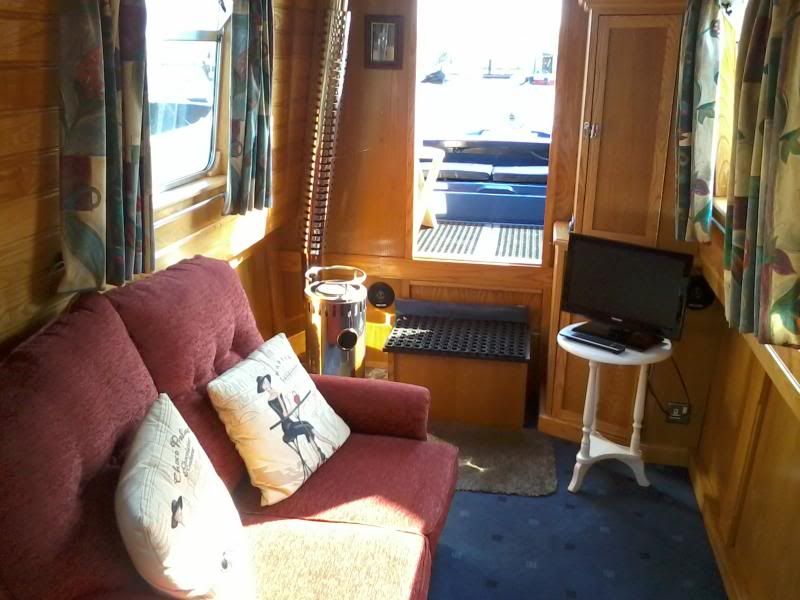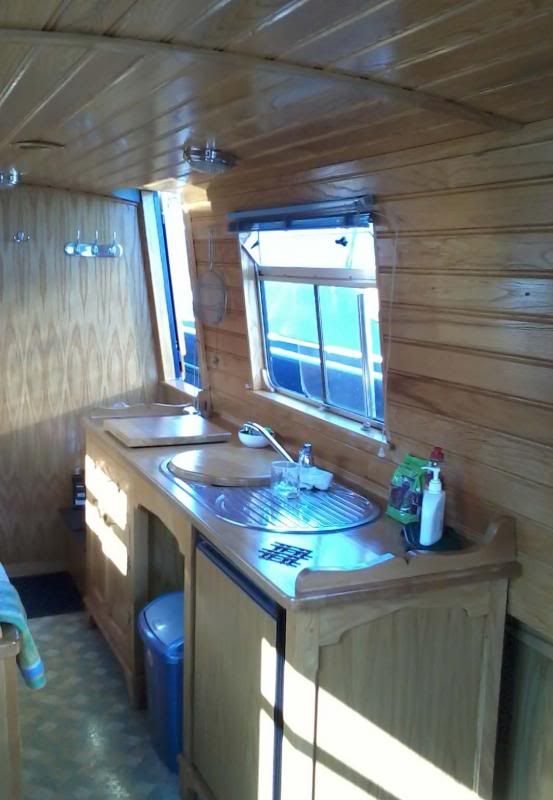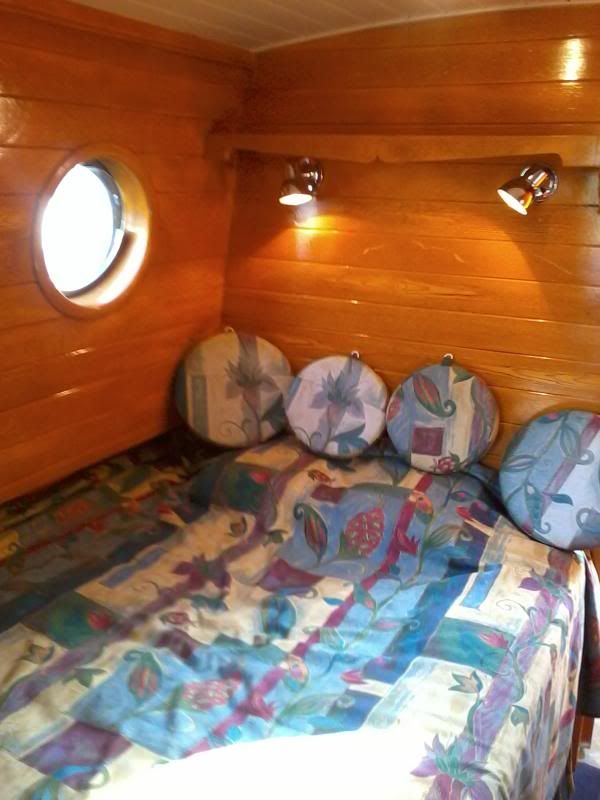Bradford on Avon and Devizes is a great trip on the canal.Devizes has built a brand new marina.
Bradford has a pub tucked away by an old mill.There is a waterfall there.
Hollywood stars have been known to call in for a pint and a meal.Among one was actor Kevin Spacey.
Harrison Ford and his partner were spotted on the canal.
From Bath to Devizes there are numerous cafes and pubs.The canal in summer is packed with dog walkers,walkers and cyclists.
Maybe Harry could set up a business as a fuel tanker on his boat.Delivering red diesel or fire wood to potential clients.
One thing that would do well is a mobile laundrymat.Washing machines and driers on the boat.
Lusk:
In my ignorance, how far can you travel on the canal network in this country? Do all the canals join up or is it a case of having to get the boat lifted out of the water and transported to the next canal?
There’s a big enough network of interlinked narrow canals to keep you going pretty much forever, as long as your boat’s shorter than around 60 feet. At the moment, you can get from just north of Ripon all the way to Godalming without taking the boat out of the water, and when they reopen the Lancashire canal you’ll be able to get even further north. The broad beam canal network is not so extensive and (at the moment) not so many of those are interlinked.
^^^^
Sounds great.
Many, many years ago, with my parents, we hired a narrow boat and although I cant remember where exactly (I think it was around Rugby), what I can remember is that it chucked it down solidly from the moment we got on the boat to the minute we got off. The poor old man was drenched through to the skin each and every day.
Lusk:
^^^^
Sounds great.Many, many years ago, with my parents, we hired a narrow boat and although I cant remember where exactly (I think it was around Rugby), what I can remember is that it chucked it down solidly from the moment we got on the boat to the minute we got off. The poor old man was drenched through to the skin each and every day.
That’s the great thing about owning your own, as opposed to having one for a week. Chucking it down? Queues at locks? Accidentally fallen into the pub one lunchtime? No problem, just put off going anywhere for another day. ![]()
toby1234abc:
I am sure a couple took a canal boat over the Channel to get to the South of France.
Inland rivers/ canals to Marseille or Toulouse to the sea.
Yes the book is called Narrowdog to Carcassone.
I can just imagine telling the mrs she’s moving from her 4 bed detached( with her beloved on- suite )to a boat on a canal ![]()
![]()
![]()
![]()
![]() , 2nd thoughts
, 2nd thoughts ![]()
![]()
![]()
![]()
dozy:
I can just imagine telling the mrs she’s moving from her 4 bed detached( with her beloved on- suite )to a boat on a canal



, 2nd thoughts



she’ll have en suite kitchen and bathroom and engine room ![]()
alamcculloch:
If any one is interested a ship or boat can be made of steel and it doesnt rust in the water because there are sacrificial anodes of magnesium screwed to the hull.Those anodes rust and have to be replaced regularly.
Sorry but sacrificial anodes do not prevent a steel boat from rusting, they prevent electrolysis from eating away at the steel by being a more conductive material and degrade quicker thus leaving the metal alone. Rust is another ball game altogether.
Rust is interaction between air & moisture.
Melchett:
The Bro in laws boat.
Yes, that’s very nice, just the sort of thing I’ll be after. How does he get on with it?
Harry Monk:
Yes, that’s very nice, just the sort of thing I’ll be after. How does he get on with it?
I saw him yesterday, he was moving it to another spot along the canal so I went along for the trip. He’s learning all the time, especially as it’s colder & he needs the heating & lighting more.
As said above, there are limits to how long you can stay in one “place” (usually 14 days) before you have to move. Strangely there is no definition of how far you have to move for it to be considered another “place” & start the 14 days again…very odd.
He generally travels a couple of miles, finds a canal side pub (handy for parking his car) & moors up there. No problems so far.
From the little I’ve seen it’s certainly a different lifestyle…quiet, peaceful almost idyllic. He moored up yesterday within 800m of a main road but because the canal was well below the level of the road you couldn’t hear the traffic at all, it’s like another world!
I wouldn’t like to live on one with kids, there just isn’t the space IMO even on the longer boats but for a singleton ( like him) or a couple wanting something different it’s well worth a look… it depends on what you want out of life I suppose.
I’d do it in a heartbeat but until the little brats leave home it’s a no-no…the mrs isn’t keen either ![]()
To sum up…he’s loving every second of it but we’ll see how things go through the winter, he might have changed his mind then ![]()
^^^^
I would think that living on a narrow boat in the bleak winter is rather appealing. Cosy and all that.
Lusk:
^^^^
I would think that living on a narrow boat in the bleak winter is rather appealing. Cosy and all that.
I’m thinking the same. He lit the diesel stove yesterday & within 15-20 mins it was warm enough to sit in a t shirt. Thinking about it the actual air space on the whole boat isn’t that great, probably not much more than a large room. He has the Webasto diesel boiler (I had a look at it & it’s a bit like a night heater but heats water rather than air) & 3 radiators to go at if things get really chilly.
From what I’ve read, a bigger problem in Winter is having to open all the doors and windows to let the heat out because there’s too much of it. Generally a boat will have at least two forms of heating, sometimes three. Most popular is a combination of a calorifier, which uses heat from engine cooling (if it’s water-cooled, many boats are fitted with air-cooled Lister engines) to provide heat to radiators, and a multi-fuel heater. As you’ve said, others have Webasto or Eberspacher heaters, some heating water, some being straightforward truck night heaters.
I understand about not wanting to do it if you have children and that’s one of the reasons I’m aiming to buy in 2016, my children will be 18 then and probably will either be away at University, or will have girlfriends/boyfriends/whatever and won’t need me around on a regular basis, I’m sure they’ll visit for extended periods. My girlfriend isn’t entirely sure if she would want to live aboard, but again I’m sure she’d visit whenever possible and she’s hugely supportive of the idea.
There isn’t a defined distance you have to travel after a fortnight but the rules do say that you have to be “genuinely travelling” and in a “different neighbourhood” when you move and the CRT take a dim view of “bridge-hopping”. I’d be genuinely cruising though, I’m hoping to do a circuit of the whole network as well as the rings and spurs. Your BiL’s boat will be pretty much like what I’ll be looking for, although the one in the background in the top pic would come up a treat if it was blacked and painted too!
Harry Monk:
From what I’ve read, a bigger problem in Winter is having to open all the doors and windows to let the heat out because there’s too much of it.
That’s true. The only source of heating on my 52 footer was a small multifuel stove. I used to come home in the morning after a night at work and there would be ice on the inside of the windows: ten minutes after firing up the stove, I’d be walking around in a t shirt and opening the doors and windows. ![]()
Harry Monk:
From what I’ve read, a bigger problem in Winter is having to open all the doors and windows to let the heat out because there’s too much of it. Generally a boat will have at least two forms of heating, sometimes three. Most popular is a combination of a calorifier, which uses heat from engine cooling (if it’s water-cooled, many boats are fitted with air-cooled Lister engines) to provide heat to radiators, and a multi-fuel heater. As you’ve said, others have Webasto or Eberspacher heaters, some heating water, some being straightforward truck night heaters.
Yep, he has the engine heated calorifier but he hasn’t needed the central heating yet. Like you say the diesel fire gets things pretty hot, pretty quick.
The one thing he has noticed is that using any 240v appliance (especially his kettle) drains the batteries quickly, more so now he has to have lighting on for much longer (12v lighting & fridge) & he needs to run the engine for longer to keep them charged.
I think he said he’s booked himself a 2 month berth at a marina for Jan & Feb complete with 240v supply.
Melchett:
The one thing he has noticed is that using any 240v appliance (especially his kettle) drains the batteries quickly, more so now he has to have lighting on for much longer (12v lighting & fridge) & he needs to run the engine for longer to keep them charged.I think he said he’s booked himself a 2 month berth at a marina for Jan & Feb complete with 240v supply.
He needs to get himself a kettle which will sit on top of his woodburner or diesel stove instead of his electric one, and replace all his lightbulbs with yellow LEDs which draw very little current. Then if he gets a couple of solar panels on the roof of the boat, he won’t need 240v.
I have had 3 boats, 2 of them were GRP cruisers but my last one was a 36 ft steel cruiser. It was a lovely boat with everything on board you could think of. But there are several downsides to actually living on a boat. You have to keep filling the tank up with water and then you have to dispose of the contents of the toilet, not bad when you are at sea you can chuck it over the side but when you are on the canal system you cant do that. Even with the best heating the boats can still be cold. The shore taps freeze up so no water and the maintenance is expensive. The anodes need replacing and this involves dry docking and while its in there the hull needs cleaning off and painting. If you have clouted something with the prop it will need taking off for profiling and repair. The bowthruster tube needs cleaning out and painting. The list is endless.
Carlc:
But there are several downsides to actually living on a boat. You have to keep filling the tank up with water and then you have to dispose of the contents of the toilet, not bad when you are at sea you can chuck it over the side but when you are on the canal system you cant do that. Even with the best heating the boats can still be cold. The shore taps freeze up so no water and the maintenance is expensive. The anodes need replacing and this involves dry docking and while its in there the hull needs cleaning off and painting. If you have clouted something with the prop it will need taking off for profiling and repair. The bowthruster tube needs cleaning out and painting. The list is endless.
The “downsides” can be compared to maintaining a house though can’t they? Different yes but the same principle.
Melchett:
The “downsides” can be compared to maintaining a house though can’t they? Different yes but the same principle.
I’m sure a narrowboat will be a lot of work and involve a large amount of maintenance, but fiddling and fettling, servicing an engine, touching up paint here and there and all of the other 1001 things I’d need to do are the sort of thing I enjoy doing anyway, and I don’t plan to work, apart from maybe a few months over the Winter to top up the funds, so I should have more than enough time to keep on top of it. Re-blacking isn’t that expensive, about £10 per foot so maybe £500 every two or three years with anodes for a 40’ boat.




